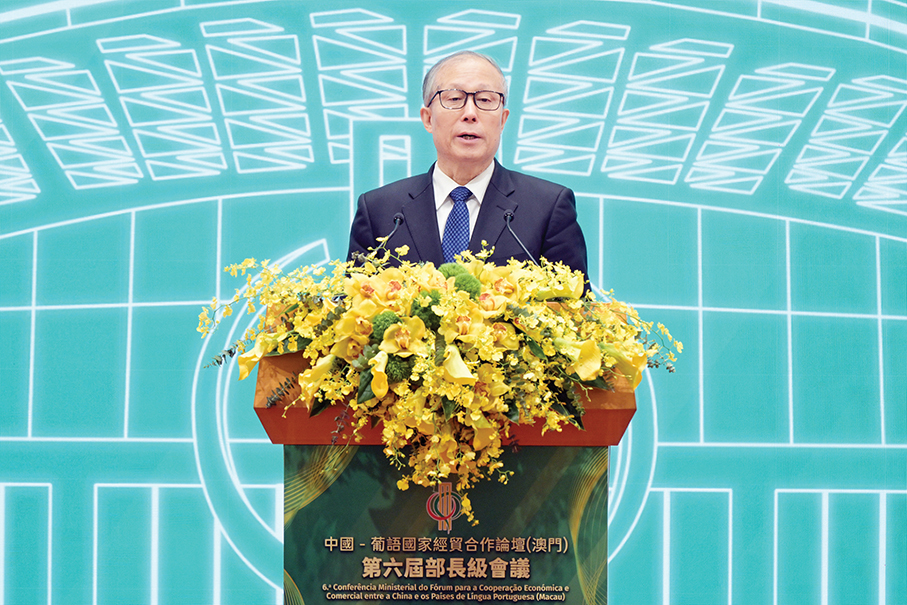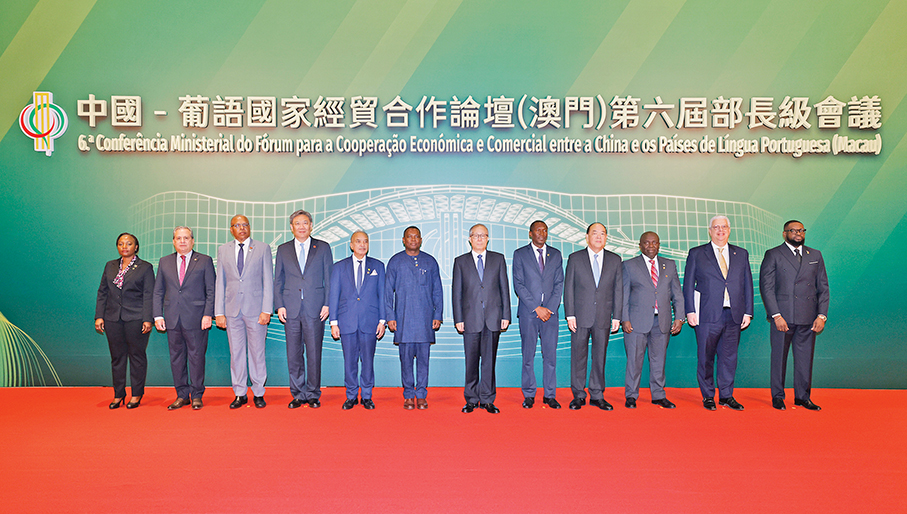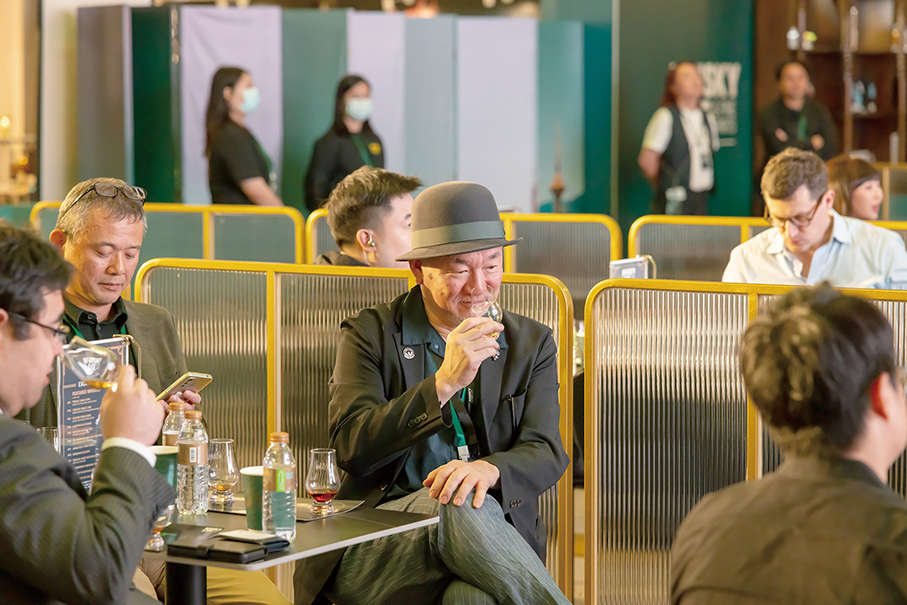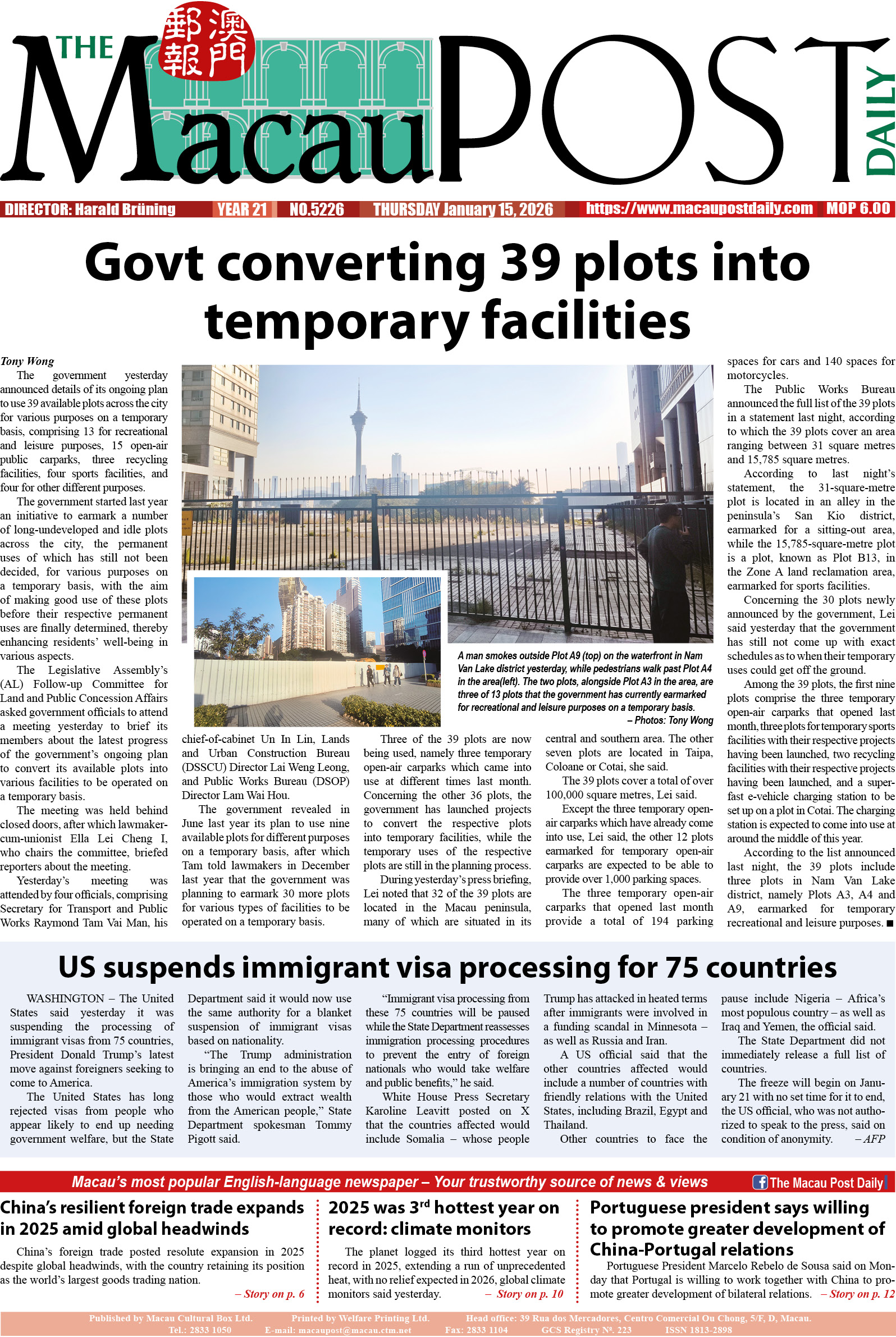Li Hongzhong, one of the central authorities’ most senior officials, made four suggestions and announced six measures for the further development, cooperation and progress of the 10-nation Forum for Economic and Trade Cooperation between China and Portuguese-speaking Countries (also known simply as Forum Macao).
Li, the first-ranked vice-chairman of the Standing Committee of the National People’s Congress (NPC), made the suggestions and announced the measures in a keynote speech during the opening ceremony of the forum’s 6th Ministerial Conference.
The opening ceremony, which was held at Forum Macao’s headquarters in Sai Van, was attended by about 1,000 people, according to the Macau Government Information Bureau (GCS), including the central government’s top officials posted to Macau – Liaison Office Director Zheng Xincong and Foreign Ministry Commissioner Liu Xianfa.
Li, a member of the Political Bureau of the Central Committee of the Communist Party of China (CPC), started his speech by pointing out that Forum Macao, with language and culture as its bond, economic cooperation as its theme, and common development as its goal, has been in existence for 21 years, with its permanent venue in Macau.
Li, 67, noted that when President Xi Jinping paid an inspection visit to Macau in 2019, he also visited Forum Macao’s then just completed headquarters and affirmed the forum’s transformation from concept to reality and from blueprint to tangible entity.
Li stressed that China and the Portuguese-speaking countries adhere to win-win cooperation, steadfastly follow the path of peaceful development, and have overcome challenges such as the global financial crisis and the COVID-19 pandemic together, providing mutual assistance and moving forward hand in hand. Since its establishment, trade between China and Portuguese-speaking countries has increased twenty-fold, and China has become one of the most important economic and trade partners for Portuguese-speaking countries, Li stressed.
The scope of cooperation between China and Portuguese-speaking countries continues to expand, Li said, adding that it has progressed from economic and trade cooperation to areas such as education, healthcare, culture, sport, and tourism. “New cooperation in addressing climate change, green development, and the blue economy has emerged,” Li said, adding that the forum has become a model of cooperation among countries with different social systems, cultural backgrounds, and stages of development, and a driving force in building a community with a shared future for mankind.
Li pointed out that the world is experiencing accelerated changes, unprecedented in terms of global, era and historical changes.
“China is comprehensively promoting the great cause of building a prosperous country and achieving national rejuvenation with Chinese characteristics,” Li said, adding that China is willing to work with Portuguese-speaking countries to promote cooperation, “expanding to a broader scope, wider areas, and higher levels, providing stronger impetus for building a closer community with a shared future for humanity, injecting more certainty and positive energy into global stability and prosperity.”
In light of this, Li said he was making the following suggestions.
4 suggestions
First, jointly build an open and inclusive world economy. China and Portuguese-speaking countries are participants, contributors, and beneficiaries of globalisation. They are willing to support the multilateral trading system with the World Trade Organisation (WTO) at its core, maintain a free and open trade system, and promote the development of economic globalisation in a more open, inclusive, and balanced direction. More Portuguese-speaking countries are welcome to join the Belt and Road Initiative (BRI), focusing on connectivity and conducting more cooperation to create new platforms for international economic cooperation.
Second, enhance the level of economic and trade cooperation. China and Portuguese-speaking countries complement each other with enormous potential for economic and trade cooperation. China has announced the comprehensive lifting of restrictions on foreign investment in the manufacturing sector and will further open up the service sector, enriching service consumption. China is willing to sign more free trade agreements (FTAs) and investment protection agreements with Portuguese-speaking countries, further opening up markets, promoting Portuguese-speaking country exports to China, and enhancing the facilitation of trade and investment. China is also willing to jointly build economic and trade cooperation zones and industrial parks in interested Portuguese-speaking countries, creating a platform for investment cooperation and strengthening cooperation in areas such as equipment, telecommunications, energy, agriculture, and natural resources to elevate the level of economic development.
Third, expand cooperation in emerging areas between China and Portuguese-speaking countries. The prospects for cooperation in emerging areas between China and Portuguese-speaking countries are broad. China is willing to enhance scientific and technological exchanges and cooperation with Portuguese-speaking countries, accelerate digital economic development, develop new productive forces, and cultivate new sources of economic growth. China is willing to jointly promote green development with Portuguese-speaking countries, engage in cooperation in areas such as new energy and low-carbon collaboration, actively respond to climate change and natural disasters, and achieve sustainable development. China is also willing to promote people-to-people exchanges with Portuguese-speaking countries, welcoming them as destinations for Chinese citizens’ outbound travel and providing convenience for Chinese citizens to visit Portuguese-speaking countries.
Fourth, enhance the role of Macau in cooperation between China and Portuguese-speaking countries and elevate the role of Macau as a platform for cooperation between China and Portuguese-speaking countries. The Macau platform plays an irreplaceable role in the forum. This year marks the 25th anniversary of Macau’s return to the motherland. China will comprehensively, accurately, and unwaveringly implement the principles of “One Country, Two Systems,” “Macau people governing Macau,” and a high degree of autonomy, maintaining long-term prosperity and stability in Macau. China is willing to work with Portuguese-speaking countries to enhance the level of the Macau platform, improve the establishment of a Portuguese-speaking countries’ food distribution centre, China-Portuguese-speaking countries small and medium-sized enterprises trade service centre, and China-Portuguese-speaking countries economic and trade cooperation exhibition centre. China is committed to organising the China-Portuguese-speaking Countries Economic and Trade Fair, supporting the development of e-commerce in Macau, and facilitating the entry of Portuguese-speaking country products and services into the Chinese market. China is also willing to continuously enrich the connotation of the Macau platform for China-Portuguese-speaking countries’ trade and economic cooperation services, as well as expand cooperation in the fields of finance, science and technology, and humanities and provide support for emerging fields.
6 new measures
Meanwhile, Li reaffirmed that China cherishes its friendship with Portuguese-speaking countries.
He stressed that China always follows through on its promises, and the measures announced at the previous ministerial-level meetings have been implemented. In the next phase, a series of new initiatives will be launched to promote the advancement of economic and trade cooperation between China and Portuguese-speaking countries, Li said. He listed the six new measures as follows:
1. Promoting trade and investment: Supporting Portuguese-speaking countries’ enterprises participation in the China International Import Expo (CIIE), providing export credit insurance to these enterprises, assisting Chinese enterprises in cooperating with Portuguese-speaking countries’ enterprises, facilitating cross-border financing, helping Chinese enterprises expand imports from Portuguese-speaking countries, providing inspection and quarantine facilitation for agricultural and food imports, strengthening trade and investment exchanges, and compiling a China-Portugal trade and investment guidebook.
2. Expanding industrial cooperation: Assisting Portuguese-speaking countries in need to enhance their agricultural capabilities, establishing and upgrading agricultural cooperation demonstration zones. Signing bilateral air transport agreements with more Portuguese-speaking countries and promoting personnel exchanges.
3. Strengthening development cooperation: Providing feasible assistance to Asian and African Portuguese-speaking countries, helping interested countries develop economic development plans, coordinating development funds, cooperating in agriculture, health, culture, transportation, and infrastructure, and implementing a series of small-scale yet impactful livelihood projects.
4. Promoting human resources cooperation: Providing 3,000 training opportunities for Portuguese-speaking countries, offering political scholarships to students from those countries studying in China, supporting the Macau Special Administrative Region (MSAR) in inviting Portuguese-speaking countries’ trainees for extended learning in the tourism sector.
5. Advancing medical and health cooperation: Deepening cooperation with Portuguese-speaking countries hospitals, conducting short-term medical projects in those countries, cultivating medical talents for Portuguese-speaking countries, establishing overseas centres for Traditional Chinese Medicine (TCM) in eligible Portuguese-speaking countries, and dispatching medical teams for foreign aid to Asian and African Portuguese-speaking countries.
6. Deepening Macau’s role as a platform: Supporting Macau in developing a financial services platform for China and Portuguese-speaking countries, developing an international bond market denominated in yuan and patacas, supporting the establishment of a China-Portuguese-speaking countries’ science and technology cooperation platform in Macau, prioritising the implementation of eligible projects, supporting the establishment of a China-Portuguese-speaking countries’ audiovisual cooperation mechanism in Macau, and promoting multifaceted cooperation.
The six new measures announced by Li are contained in the forum’s three-year action plan which was signed by its 10 member states yesterday afternoon – China and the nine Portuguese-speaking countries of Angola, Brazil, Cabo Verde (Cape Verde), Guinea-Bissau, Equatorial Guinea, Mozambique, Portugal, São Tomé and Príncipe, and Timor-Leste (East Timor).
Due to the three-year COVID-19 pandemic and schedule issues, the forum’s previous Ministerial Conference, supposed to be held every three years, took place in Macau in October 2016.
Officials from 9 PSCs praise Forum Macao’s usefulness
Senior officials from the forum’s nine Portuguese-speaking countries (PSCs) also addressed yesterday morning’s opening ceremony. All of them praised Forum Macao’s usefulness in achieving mutually beneficial cooperation among its 10 members.
For instance, Timor-Leste’s Vice Prime Minister, Minister Coordinator for Economic Affairs and Minister of Tourism and Environment Francisco Kalbuadi Lay said in his speech that the forum’s “important role” in facilitating cooperation in the area of infrastructure projects between China and PSCs. He listed five main areas where Forum Macao was a useful facilitator: industrial revitalisation; infrastructure development; food self-sufficiency; better living conditions; and sustainable coastal management as a part of blue economy development.
Meanwhile, Pedro Reis, Portugal’s new economy minister underlined the “good understanding” between China and his country and praised Macau’s role in promoting Forum Macao. He called for a “joint reflection” on the forum’s existing financial mechanism, namely via its cooperation fund, as Portugal believed there was still room for “intensifying” financial support measures for the businesses in the PSCs, small- and medium-sized enterprises (SMEs) in particular.
Chief Executive Ho Iat Seng hosted a dinner for the participants in the forum last night.
The 6th Ministerial Conference will be followed today by a one-day entrepreneurs conference, which will be co-chaired by Deputy Minister of Commerce Guo Tingting and Macau Special Administrative Region (MSAR) Secretary for Economy and Finance Lei Wai Nong.

National People’s Congress (NPC) Standing Committee Vice Chairman Li Hongzhong delivers the keynote address at the opening ceremony of the 6th Ministerial Conference of Forum Macao at its headquarters in Sai Van yesterday. – Photo: GCS

National People’s Congress (NPC) Standing Committee Vice Chairman Li Hongzhong (sixth from right) and Macau Special Administrative Region (MSAR) Chief Executive Ho Iat Seng (fourth from right) pose with the heads of the delegations from nine Portuguese-speaking countries during the 6th Ministerial Conference of Forum Macao yesterday. The forum’s 10 member states signed yesterday their Strategic Plan for Economic and Trade Cooperation (2024-2027), informally known as three-year action plan. – Photo: GCS







